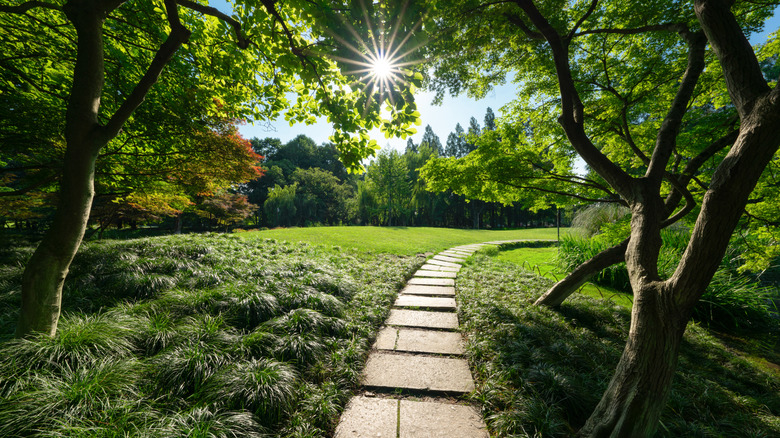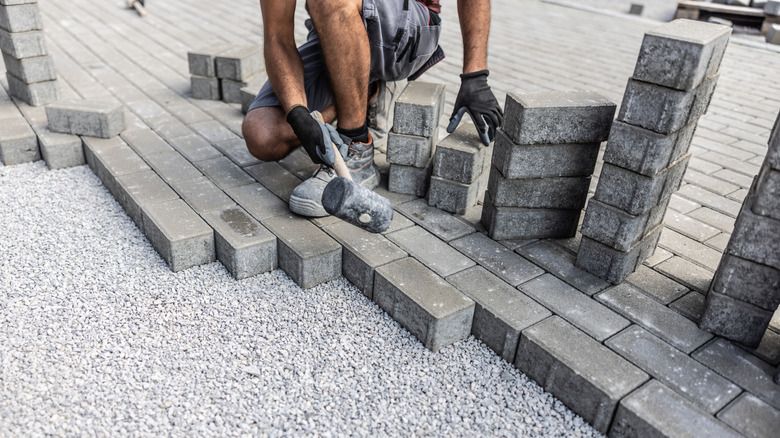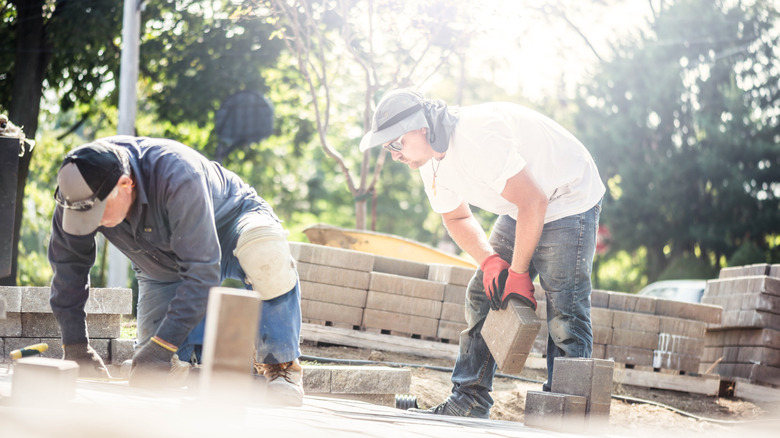Is It Safe To Lay And Install Pavers On A Slope?
Hardscaping can significantly improve the value of your home. If you've got a relatively flat lawn, there are a variety of beautiful DIY paver projects that will instantly elevate your landscaping. But is it safe to lay and install pavers on a sloped lawn? When working with uneven ground that's suffered from erosion or burrowing animals, or if the natural topography of your property undulates with gentle slopes and valleys, the process can be much more complex. According to Andrey Likhman, Owner and Principal of Vandeck Builders, when you use proper preparation and stable materials, you can safely lay and install pavers — as long as your site's grade is under 5% and doesn't require advanced drainage solutions.
"It can be safe for homeowners to install pavers on a mild slope, as long as they take the time to properly prepare the site," Likhman told House Digest during an exclusive interview. "A 1–5% grade is manageable, but anything steeper tends to bring more challenges." Although you can probably rule out a steep hill based on your visual observation alone, for slight slopes you'll still want to measure. The process is simple and requires just a few basic materials: stakes, string, and a level. Put the stakes in the ground at the highest and lowest point and tie the string between them, ensuring it's level. Then, head back to math class by dividing the rise (distance between the string and the ground) by the run (distance between the two stakes), multiplying the number by 100 to get the grade percentage.
Consider the grade and water flow on your property
Along with choosing the right type of pavers, properly preparing your site is one of the most important steps when laying and installing hardscaping on a slope. "Without the right base preparation, pavers on a slope can shift over time or create drainage issues that are difficult to fix later," Andrey Likhman said during an exclusive interview with House Digest. Likhman also added that a main challenge is keeping each paver stable over time, and managing water runoff, "A sloped surface puts extra pressure on the base material, so it needs to be compacted well."
If you want to install pavers on a slope safely, the landscaping expert recommended starting with a plan for both the grade and direction of your water flow. It's wise to watch the natural flow of water in your yard during and after a heavy rainstorm to better understand how water moves and drains naturally in your space. Taking photos and videos may be helpful as you plan out any grading work that might need to happen prior to building a base or laying your first paver. "The base should be excavated and compacted in layers, using crushed stone for strength," Likhman said. "[Then], begin laying pavers at the lowest point, working upward, and use edge restraints or step breaks for extra stability."
Keep safety in mind and call in experts when dealing with significant slopes
Along with forgetting to check for underground utilities before you start digging, neglecting to do proper site preparation is one of the most common mistakes to avoid when laying pavers in your outdoor space. Whether you're working with a flat surface or a slope that requires grading before getting started, preparation is critical if you want your paver project to last. During an exclusive interview with House Digest, Andrey Likhman cautioned that because excavation, compacting base materials, and lifting pavers are especially hard work, you should keep safety in mind, "Having someone help with lifting and positioning can make the job safer and easier."
There are also situations where DIY paver installation is not feasible. "If the slope is greater than 5%, or if the project requires terracing, retaining walls, or advanced drainage, it's a good idea to bring in a professional," Likhman said. This is especially important if you're planning a paver project close to your home, since disrupting the soil around your foundation — without proper grading — can direct water in the wrong direction and be extremely destabilizing. Likhman added that these problems are easily avoided when you call in experts, "A pro can make sure the structure holds up over time and looks polished when it's finished." According to Angi, paver installation typically costs between $8 to $25 per square foot, depending on the overall size of your project — not to mention the costs for excavation, base material, and your pavers.


